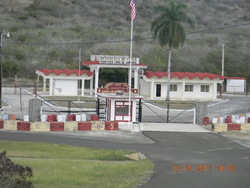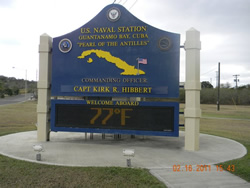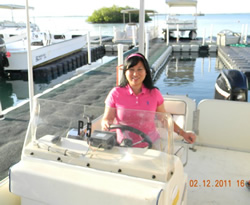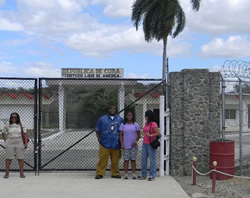- Home » Expat Articles » Interviews » US Expat In Guantanamo Bay, Cuba - Interview With Kristen
US Expat In Guantanamo Bay, Cuba - Interview With Kristen
| Published: | 9 Dec at 9 AM |
Want to get involved?
Become a Featured Expat and take our interview.
Become a Local Expert and contribute articles.
Get in touch today!
Become a Local Expert and contribute articles.
Get in touch today!
Filed: Interviews,Cuba
Kristen Bui is a former journalist, grant writer and Fund Development Coordinator for various non profit agencies. Currently, she resides as an American expat in Guantanamo Bay, Cuba, and is a full-time housewife and blogger who homeschools her teen daughter. Her love and passion for entertaining and educating people with words have encouraged her to start a blog. She hopes that “Life as an Expat in GTMO, Cuba” (see listing here) will be an educational and entertaining resource for those who seek information about GTMO and are curious about life on the remote U.S. naval base. Her quirky sense of humor derives from her background as a Vietnamese native who immigrated to the U.S. and grew up in southern “Bible Belt” communities. Her unique insight and perspective on GTMO life will hopefully allow you to personally share some of her experiences through her writing.

Where are you originally from?
I was born in Vung Tau, South Vietnam but grew up in southern parts of the U.S., mainly in Arkansas and Oklahoma. Later, I lived in Texas.
In which country and city are you living now?
Currently, I am an American expat living in Guantanamo Bay, Cuba, a U.S. naval base.
How long have you lived here and how long are you planning to stay?
I joined my husband in GTMO on December 29, 2010 and plan on staying til Nov. 27, 2012.
Why did you move and what do you do?
I moved to GTMO, Cuba, because my husband received his first contracting position in GTMO. He accepted the position in August 2010 because he thought it would be a career opportunity that would allow him to have overseas work experience. Also, he wanted to experience “living abroad.” Our daughter and I joined him 3 months later after the company changed his position from unaccompanied to accompany. We joined him because we have never lived separately before, and the separation was a huge adjustment for our family. We didn’t believe families being separated would be a good thing, and we also thought that living in GTMO would mean less expenses for our family since we would not have to pay for housing, utilities and activities were either free or cost very little. Since I lived in GTMO, I am a full time housewife and homeschool my daughter.
 Did you bring family with you?
Did you bring family with you?
My husband initially was not allowed to have us with him in GTMO. Three months later, we joined him.
How did you find the transition to living in a foreign country?
At first, I loved GTMO, but my daughter had a difficult time adjusting since we had to change a lot of things about our lives. We had to homeschool her, and she didn’t like that idea. My husband’s contract didn’t include education costs, which meant we had to pay for the tuition at the DoD school. The tuition rate is very high so we ended up homeshooling. After about 3 months of living in GTMO, I started to dislike life here more. Ironically, adjusting to GTMO life became more and more challenging for me because I started to learn more about the remote island. I was so busy with unpacking and settling in the first 3 months, I barely really got to know GTMO. After learning about GTMO’s culture and ways of life, I began to realize that GTMO was not a good place to raise my preteen daughter.
 Was it easy making friends and meeting people; do you mainly socialise with other expats?
Was it easy making friends and meeting people; do you mainly socialise with other expats?
Meeting people was extremely easy for our family. We received lots of invitations for get togethers and hosted dinners at our home regularly when we first moved to the island. Making friends may be a little different. It is not easy to make friends because people in GTMO aren’t as open as people I am used to stateside. People here tend to be more “secretive.” The friendships we have in GTMO are pretty artificial since you don’t really get to know someone that well. Basically, friendships are just people who you meet to do things with. It is very rare that you learn enough information about people to really develop a trusting friendship. Plus, people come and go fairly frequently. Most people only stay about 2-3 years the most. By the time you get to know them, they are moving.
Our family socializes with expats, DoD fed gov’t civilians, foreign nationals (Filipino and Jamaican workers) and active military.
What are the best things to do in the area; anything to recommend to future expats?
If you are an outdoorsy type of person, I highly recommend you to participate in any or all of the outdoor activities. They are very inexpensive. There’s fishing (no license required), boating, kayaking, golfing, scuba diving, snorkeling, even surfing. All of these activities are very inexpensive. Although I don’t like the amphitheatre, I still recommend expats to attend an outdoor movie showing just for the experience. Surprisingly, our family actually enjoyed watching a movie in the rain wearing a pancho. I also recommend any expat to go on the Northeast Gate Tour. It’s given every 3rd Friday. The tour includes you getting to stand near the Cuban fence line. Once in awhile, ships will dock in GTMO to refuel or to obtain more supplies. They will offer ship tours. I highly recommend expats going on these tours as well.
 What do you enjoy most about living here?
What do you enjoy most about living here?
I like the fact that activities are fairly inexpensive or free. Also, free housing and free utilities are a plus here.
How does the cost of living compare to home?
It depends. Cost of living can be either expensive or inexpensive depending on your expat status in GTMO. For U.S. contractor expats (like us), it can get rather expensive if you take into consideration the cost of travel in/out of GTMO along with educational costs for your minor children.
Although we don’t have to pay for housing or utilities, U.S. contractors still may incur other expenses that DoD fed gov’t civilians and active military do not, which can cause cost of living to be high. For example, travel for U.S. contractors are typically high because we don’t get the low airfare discounts, like DoD civilians and military people do.
Although most companies allow U.S. contractors 2 free trips home per year, if you have family members (like wife and child), you would have to pay for their airfare. Airfare in and out of GTMO is very high and also unreliable. Unreliable flights can cause other issues (such as missing your connecting flight, etc.) which means having to pay a new full price airfare ticket or hotel or both.
Also, U.S. contractor expats typically have to fly back stateside for medical/health services. The services on island are very limited. If you have a child who wears braces, it can get very expensive because you have to fly back stateside for every appointment.
Food prices are typically higher at the grocery stores in GTMO than stateside. If they are low or normal price range, it’s because the food is about to expire so they go on sale.
Restaurant prices are also a bit high compared to stateside if you take into consideration the quality and service. The least expensive place to eat on island is at one of the galleys.
 What negatives, if any, are there to living here?
What negatives, if any, are there to living here?
Travelling in/out of GTMO is always stressful to most people because flights are unreliable and limited. Other negatives include limited cultural activities, limited shopping (only one store on island) and limited number of restaurants. Another negative is that it can be difficult to get supplies on island so often times our grocery store will be out of stock on everyday items such as eggs, bread, etc. For U.S. contractor expats, dental care appointments are extremely difficult to get because they have a priority patient list and expats (U.S. contractors) are at the bottom of the list. Another negative includes the type of people living in GTMO. For some reason, the population in GTMO is concentrated with people who seem to be socially awkward. Infidelity is rampant on base so people seem to be highly suspicious of others. Normally, this would not affect the quality of lives for people, but it does in GTMO because the naval base is so small and everyone is concentrated in a small area. There is no consistency. One day, there is a certain way to do something and the very next day the rules or procedure is different. As a matter of fact, rules and procedures can change with different people working. One day one person does something one way and the next day, you have to do it differently because someone else is at the counter or working that day. Information is difficult to obtain not because of poor communication resources/tools, but because those who are supposed to offer information just don’t follow through sometimes.
If you could pick one piece of advice to anyone moving here, what would it be?
Not to move to GTMO. If you move to GTMO, be prepared to live a life with limited choices, inconsistency, and among a concentrated population of socially awkward people. There are positives about the base, but they normally do not outweigh the negatives.
What has been the hardest aspect to your expat experience so far?
Adjusting to life with limited choices and inconsistency.
When you finally return home, how do you think you'll cope with repatriation?
I believe returning home will be a breeze for our family, especially me, since I have never really adjusted to GTMO life.
What are your top 5 expat tips for anyone following in your footsteps?
Tell us a bit about your own expat blog.
Life of an Expat in GTMo, Cuba is a site where you can find information and hopefully entertaining stories about my experiences as a southern American, Vietnamese born expat currrently residing in GTMO. I started this blog because when I first moved to GMTO, I couldn’t find any information online about important issues that have a direct impact on the quality of life for our family on base. I only found information on detainee camps and blogs that included people’s daily activities such as boating, fishing, holiday activities, etc.
How can you be contacted for further advice to future expats coming to your area?
You may contact me on my blog (see below) or via email: kristenbui{at}yahoo{dot}com or Facebook: Kristen Thi Bui
Kristen blogs at http://gtmoexpatlife.wordpress.com/ which we recommend a quick visit if you haven't been already. Life of an Expat in Guantanamo Bay has an ExpatsBlog.com listing here with some great comments already - but there's always room for more, so add a review if you like! If you appreciated this interview with Kristen, please let her know by leaving a comment below.

Here's the interview with Kristen...
Where are you originally from?
I was born in Vung Tau, South Vietnam but grew up in southern parts of the U.S., mainly in Arkansas and Oklahoma. Later, I lived in Texas.
In which country and city are you living now?
Currently, I am an American expat living in Guantanamo Bay, Cuba, a U.S. naval base.
How long have you lived here and how long are you planning to stay?
I joined my husband in GTMO on December 29, 2010 and plan on staying til Nov. 27, 2012.
Why did you move and what do you do?
I moved to GTMO, Cuba, because my husband received his first contracting position in GTMO. He accepted the position in August 2010 because he thought it would be a career opportunity that would allow him to have overseas work experience. Also, he wanted to experience “living abroad.” Our daughter and I joined him 3 months later after the company changed his position from unaccompanied to accompany. We joined him because we have never lived separately before, and the separation was a huge adjustment for our family. We didn’t believe families being separated would be a good thing, and we also thought that living in GTMO would mean less expenses for our family since we would not have to pay for housing, utilities and activities were either free or cost very little. Since I lived in GTMO, I am a full time housewife and homeschool my daughter.
 Did you bring family with you?
Did you bring family with you?My husband initially was not allowed to have us with him in GTMO. Three months later, we joined him.
How did you find the transition to living in a foreign country?
At first, I loved GTMO, but my daughter had a difficult time adjusting since we had to change a lot of things about our lives. We had to homeschool her, and she didn’t like that idea. My husband’s contract didn’t include education costs, which meant we had to pay for the tuition at the DoD school. The tuition rate is very high so we ended up homeshooling. After about 3 months of living in GTMO, I started to dislike life here more. Ironically, adjusting to GTMO life became more and more challenging for me because I started to learn more about the remote island. I was so busy with unpacking and settling in the first 3 months, I barely really got to know GTMO. After learning about GTMO’s culture and ways of life, I began to realize that GTMO was not a good place to raise my preteen daughter.
 Was it easy making friends and meeting people; do you mainly socialise with other expats?
Was it easy making friends and meeting people; do you mainly socialise with other expats?Meeting people was extremely easy for our family. We received lots of invitations for get togethers and hosted dinners at our home regularly when we first moved to the island. Making friends may be a little different. It is not easy to make friends because people in GTMO aren’t as open as people I am used to stateside. People here tend to be more “secretive.” The friendships we have in GTMO are pretty artificial since you don’t really get to know someone that well. Basically, friendships are just people who you meet to do things with. It is very rare that you learn enough information about people to really develop a trusting friendship. Plus, people come and go fairly frequently. Most people only stay about 2-3 years the most. By the time you get to know them, they are moving.
Our family socializes with expats, DoD fed gov’t civilians, foreign nationals (Filipino and Jamaican workers) and active military.
What are the best things to do in the area; anything to recommend to future expats?
If you are an outdoorsy type of person, I highly recommend you to participate in any or all of the outdoor activities. They are very inexpensive. There’s fishing (no license required), boating, kayaking, golfing, scuba diving, snorkeling, even surfing. All of these activities are very inexpensive. Although I don’t like the amphitheatre, I still recommend expats to attend an outdoor movie showing just for the experience. Surprisingly, our family actually enjoyed watching a movie in the rain wearing a pancho. I also recommend any expat to go on the Northeast Gate Tour. It’s given every 3rd Friday. The tour includes you getting to stand near the Cuban fence line. Once in awhile, ships will dock in GTMO to refuel or to obtain more supplies. They will offer ship tours. I highly recommend expats going on these tours as well.
 What do you enjoy most about living here?
What do you enjoy most about living here?I like the fact that activities are fairly inexpensive or free. Also, free housing and free utilities are a plus here.
How does the cost of living compare to home?
It depends. Cost of living can be either expensive or inexpensive depending on your expat status in GTMO. For U.S. contractor expats (like us), it can get rather expensive if you take into consideration the cost of travel in/out of GTMO along with educational costs for your minor children.
Although we don’t have to pay for housing or utilities, U.S. contractors still may incur other expenses that DoD fed gov’t civilians and active military do not, which can cause cost of living to be high. For example, travel for U.S. contractors are typically high because we don’t get the low airfare discounts, like DoD civilians and military people do.
Although most companies allow U.S. contractors 2 free trips home per year, if you have family members (like wife and child), you would have to pay for their airfare. Airfare in and out of GTMO is very high and also unreliable. Unreliable flights can cause other issues (such as missing your connecting flight, etc.) which means having to pay a new full price airfare ticket or hotel or both.
Also, U.S. contractor expats typically have to fly back stateside for medical/health services. The services on island are very limited. If you have a child who wears braces, it can get very expensive because you have to fly back stateside for every appointment.
Food prices are typically higher at the grocery stores in GTMO than stateside. If they are low or normal price range, it’s because the food is about to expire so they go on sale.
Restaurant prices are also a bit high compared to stateside if you take into consideration the quality and service. The least expensive place to eat on island is at one of the galleys.
 What negatives, if any, are there to living here?
What negatives, if any, are there to living here?Travelling in/out of GTMO is always stressful to most people because flights are unreliable and limited. Other negatives include limited cultural activities, limited shopping (only one store on island) and limited number of restaurants. Another negative is that it can be difficult to get supplies on island so often times our grocery store will be out of stock on everyday items such as eggs, bread, etc. For U.S. contractor expats, dental care appointments are extremely difficult to get because they have a priority patient list and expats (U.S. contractors) are at the bottom of the list. Another negative includes the type of people living in GTMO. For some reason, the population in GTMO is concentrated with people who seem to be socially awkward. Infidelity is rampant on base so people seem to be highly suspicious of others. Normally, this would not affect the quality of lives for people, but it does in GTMO because the naval base is so small and everyone is concentrated in a small area. There is no consistency. One day, there is a certain way to do something and the very next day the rules or procedure is different. As a matter of fact, rules and procedures can change with different people working. One day one person does something one way and the next day, you have to do it differently because someone else is at the counter or working that day. Information is difficult to obtain not because of poor communication resources/tools, but because those who are supposed to offer information just don’t follow through sometimes.
If you could pick one piece of advice to anyone moving here, what would it be?
Not to move to GTMO. If you move to GTMO, be prepared to live a life with limited choices, inconsistency, and among a concentrated population of socially awkward people. There are positives about the base, but they normally do not outweigh the negatives.
What has been the hardest aspect to your expat experience so far?
Adjusting to life with limited choices and inconsistency.
When you finally return home, how do you think you'll cope with repatriation?
I believe returning home will be a breeze for our family, especially me, since I have never really adjusted to GTMO life.
What are your top 5 expat tips for anyone following in your footsteps?
- Research GTMO as carefully and thoroughly as possible by connecting with a U.S. contractor currently on the island or who have lived in GTMO. If you communicate with a DoD civilian, a foreign national and/or an active duty military, their experiences will be different (most likely better) than U.S. contractors.
- Do not change your lifestyle or habits to meet the typical or acceptable GTMO lifestyle. The culture and lifestyle in GTMO is very different from what most stateside people would consider acceptable, appropriate or “normal.”
- If you love ethnic cuisine, ship your favorite ingredients. They are very difficult to find at our grocery stores. Also, if you have certain food allergies or dietary requirements, make sure you ship those ingredients or items that meet your dietary needs.
- Be careful in choosing your friends and social circle. Gossip, like infidelity, is rampant on this base.
- When you pick mangoes from the mango trees, make sure you wear gloves or protective gear. You may not be allergic or have any negative reaction to eating mangoes, but the mango sap can cause you to break out in a rash if it gets onto your skin. It is not poison ivy or poison oak, but it sure does look and feel like it.
Tell us a bit about your own expat blog.
Life of an Expat in GTMo, Cuba is a site where you can find information and hopefully entertaining stories about my experiences as a southern American, Vietnamese born expat currrently residing in GTMO. I started this blog because when I first moved to GMTO, I couldn’t find any information online about important issues that have a direct impact on the quality of life for our family on base. I only found information on detainee camps and blogs that included people’s daily activities such as boating, fishing, holiday activities, etc.
How can you be contacted for further advice to future expats coming to your area?
You may contact me on my blog (see below) or via email: kristenbui{at}yahoo{dot}com or Facebook: Kristen Thi Bui
Kristen blogs at http://gtmoexpatlife.wordpress.com/ which we recommend a quick visit if you haven't been already. Life of an Expat in Guantanamo Bay has an ExpatsBlog.com listing here with some great comments already - but there's always room for more, so add a review if you like! If you appreciated this interview with Kristen, please let her know by leaving a comment below.
Grab a featured expat badge that links to this interview!
 Copy and paste code to display the Featured Expat Badge:
Copy and paste code to display the Featured Expat Badge:Comments » No published comments just yet for this article...
Feel free to have your say on this item. Go on... be the first!





